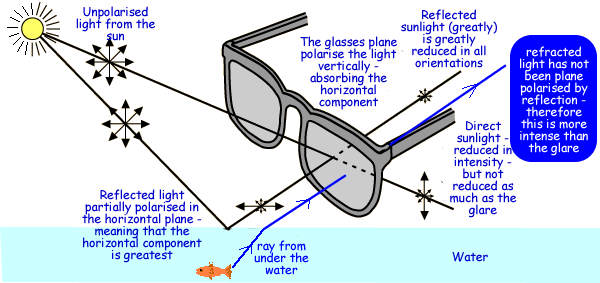|
Polaroid sunglasses to minimise 'glare'.
When light is reflected from a bright non-metallic surface (e.g. wet roads, smooth surface of water, polished tables etc) suffers partial plane poliarisation. This means that more of the reflected light is vibrating in one plane than the other.
For example, if you look at the morning sun reflected from a pond's surface the light waves that vibrate parallel to lake's surface have larger amplitude than the reflected wave that vibrate perpendicular to it. Therefore if you look at the surface of the water from an angle close to the horizontal you get more light that is reflected off the surface than light that comes out of the water by refraction. You therefore cannot see what is under the surface, just a bright flash - glare,

To reduce the glare of this light and to view objects under the surface more clearly we can wear Polaroid sunglasses. These contain polaroid cores with transmission axes that are oriented vertically so the glasses absorb the horizontally polarised light and as the glare is composed of that orientation of light they therefore reduce the glare.
 Fishermen wear Polaroid glasses to eliminate reflected glare from the surface of a lake or stream and they can therefore see beneath the water more clearly. Fishermen wear Polaroid glasses to eliminate reflected glare from the surface of a lake or stream and they can therefore see beneath the water more clearly.
 Photographers sometimes use Polaroid sheets in front of lens to reduce the glare of light reflected from a surface. Photographers sometimes use Polaroid sheets in front of lens to reduce the glare of light reflected from a surface.
Example Questions:
Q1. Polaroid sunglasses are designed to transmit primarily...
A. horizontally polarized light.
B. vertically polarized light.
C. longitudinal light waves.
D. refracted waves.
E. light other than blue.
Light reflected from surfaces like a flat road or smooth water is generally horizontally polarized. This horizontally polarized light is blocked by the vertically oriented polarizers in the lenses.
So the answer is B.
Q2. Why do Polaroid sunglasses reduce glare, whereas nonpolarized sunglasses simply cut down the total amout of light reaching the eyes?
Because glare is reflected light and this is partially plane polarised horizontally. The plane polarity of the glasses is perpendicular to the polarity of the glare and therefore absorbs most of the glare. Unpolarised glasses simply absorb some of the light in all orientations and therefore reduces the glare and the non glare elements in equal amounts - not solving the problem!
Q3. Why are Polaroid sunglasses not recommended for safe viewing of the sun during a solar eclipse?
Because they do nothing to block out the damaging rays. They just cut down glare by absorbing the horizontal component of polarisation of light.You should never look directly at the sun (with or without sunglasses).
|